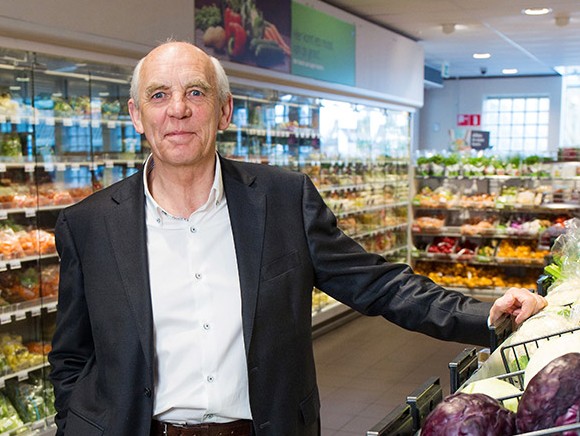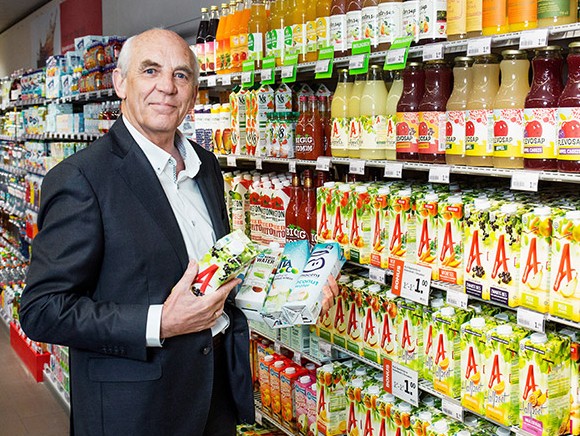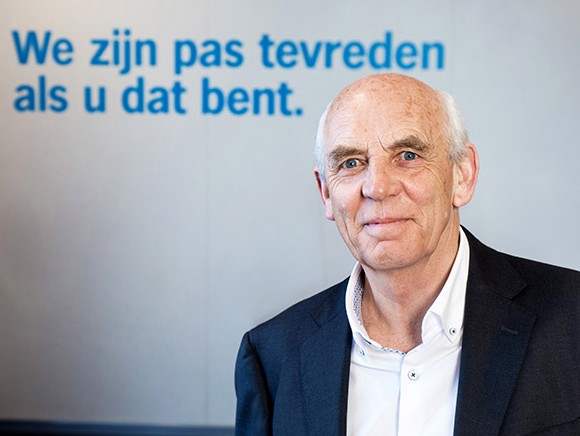
Aalt Dijkhuizen has been a figurehead for the Dutch agri-food sector at home and abroad for many years. He has been chair of the Top Team Agri & Food since 2014, and on 1 April of this year the Top Team also named him as chair of the Top Consortium for Knowledge and Innovation (TKI) board. This will enable the Top Team to strengthen the link between strategy and execution.
Aalt Dijkhuizen spent 12 years as chair of the Wageningen University & Research Executive Board and is one of the architects of the successful ‘golden triangle’ in which entrepreneurs and academics in agri-food collaborate on innovation with government support. The TKI is one of the implementation lines for the so-called Top Sector.
“Within the Top Sector companies, knowledge institutes and government agencies work together in the Netherlands to strengthen the industry. The industry faces major challenges – but they also offer lots of opportunities. As a result of the growing world population plus more people in the world with higher incomes, there is a rising demand for high-quality protein: vegetables, dairy and meat. Besides that, consumers are becoming more critical and placing higher demands on food quality and safety. At the same time, resources such as energy and water are becoming more scarce. In this world, with a growing food market, the Netherlands must innovate in order to stay ahead as an agri & food country. The Top Team determines which direction the innovation activities should take, and the Top Consortium steers the research performed for the purpose of innovation.”
“The large majority of the research is of an applied nature and comprises initiatives that should generate value within 3 to 5 years. Another share of the research relates to long-term studies that won’t produce results for ten years or more. And then last but not least there are projects that should almost immediately deliver payback for the participating companies. Any company within the sector can get involved and many of them already are, including SMEs [small and medium-sized enterprises, Ed.] and slightly larger companies. The projects with a short duration and short-term valorisation are probably a better fit for smaller companies. One good example of that is Breed4Food, in which Dutch competitors are working together on applied research to improve animal breeding practices. The participants individually valorise the knowledge gained. Another example relates to personalised nutrition and involves the development of knowledge and tools to be able to provide people with individualised dietary advice.”

“We need to work on innovation every day”
“More than 400 of the companies that have taken part over the years have been SMEs. To make it easier for those companies we work with ‘innovation agents’ who help companies to find precisely what they’re looking for in the research world. There is EUR55 million worth of subsidy available especially for SMEs. There are already a lot of SMEs from agri & food involved but I’d like to see even more taking part in our push for innovation, so I encourage them to contact us.”
“We’ve selected nine themes to focus on, including smart agri & food, consumer and chain, nutrition and health, food safety and biobased economy. We’re working on smarter technology in order to be able to continue to provide the world population with sufficient high-quality and safe food in a sustainable manner in the future. New digital technology plays a major role in that, such as new advancements in IT, autonomous machines and sensors. You can also think of drones to support optimal crop development or IT facilitating individualised feeding and health monitoring of farm animals. We need to utilise smart techniques in the whole chain.”
“We will also need to improve our energy and water efficiency and to reuse what ‘spills over’. One example is manure which, when you break it down into its individual components, actually contains some substances that are very suitable for reuse. In principle, nothing may go to waste in the circular economy. By then also extending the shelf life of products, we reduce the chance of any investment – of raw materials, energy and water – in the end product being lost.
“I’d like to see even more SME companies taking part in our push for innovation”
“Furthermore, we can achieve significant improvements by thoroughly analysing all the data we gather via our equipment – the machines – and by sharing information with the people who need it in the next link in the chain, such as by informing consumers about where their food has come from and hence enabling them to make healthy choices. I believe in the potential of personalised nutrition. It requires detailed information about everything that has been done and used in the production process and about the nutritional value of the product. Consumers will be willing to pay for that.”
“We’re not focusing on one particular technology more than the rest; we’re hedging our bets by working on several solutions and want to make progress with each one.”

“I travel a lot, including to and within China, and I’ve noticed that no one is standing still – and we can’t afford to do so either. I’m confident that we can maintain and further extend our lead as a world-class player in agri & food, but we will need to work on innovation every day. In the Netherlands we are good at rapidly applying newly developed technology. That has helped us to become an important agri & food nation, despite – or perhaps because of – our country’s limited availability of agricultural land and the high wages. We are now strengthening that capacity to rapidly innovate within the Top Sector by bridging the gap between making the strategic decisions and making the necessary resources available. The only way to ensure that we will still be interesting for the rest of the world ten years from now is to innovate.”
Source: ©Herbert Wiggerman